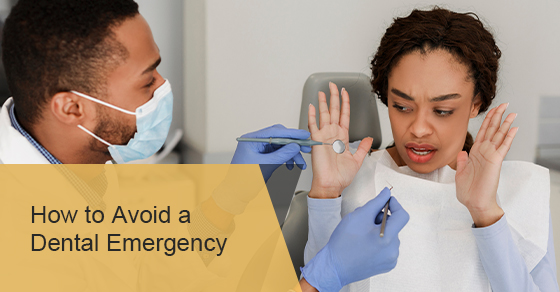
A dental emergency can be one of the scariest and painful situations you will experience, so it is important to have a plan in place in case something happens. This means you should understand how to cope with a traumatic dental event, as well as have an emergency dental clinic in mind. Dental emergencies are not only painful for your body, but they can be painful for your wallet too. By being cautious and taking preventative measures, most dental emergencies can be avoided.
Here are some tips on how you can avoid a dental emergency.
The first step to avoiding a dental emergency is to always keep a good oral hygiene routine daily. Make sure that you are brushing and flossing, as this will keep your mouth healthy, clean, and free of any cavities, which can lead to something severe if not treated in time. Make sure that you are brushing your teeth at least twice a day for 2 minutes every session. This amount of time will help you make sure that every surface of each tooth is cleaned thoroughly. Electric toothbrushes will usually have a built-in 2-minute timer, but if you are using a manual brush, you can simply set a timer.
Regularly scheduled dental check-ups and cleanings allow your dentist to identify problems with your teeth and gums before they become a dental emergency. Not only can your dentist find cavities before they cause pain, they can also see any small fractures or weak spots that might chip or break a tooth if left untreated.
You might think that you should go in for a dental exam once or twice a year, but the American Dental Association actually recommends that you create a personalized dental care plan with your dentist. This is because some people are fine with yearly exams, yet others might need more frequent visits if they have weak enamel or a high level of oral bacteria.
This could be a nagging toothache, or a filling that is crumbling. Tooth pain is usually a sign that something is wrong, but if it goes away, you might be tempted to ignore it altogether. But you shouldn’t! When it comes to a severe tooth infection, it can damage or kill your tooth’s nerve causing you to think the infection has disappeared. Dental infections never go away on their own and require professional dental care. The quicker you can see a dentist, the more likely you will be able to save your tooth.
You should also be aware of any changes to your gums or oral tissues (the inside of your cheeks and lips, the roof and floor of your mouth and tongue). Any injuries, mouth sores, or ulcers that do not heal properly need to be examined by a dental professional.
We recommend replacing your toothbrush every 2 to 3 months, or even more frequently if you notice it looking worn or splayed. Electric toothbrush heads will typically have built-in wear indicators, so it is easy to know when it’s time to replace the head. If your toothbrush is too worn down, then it won’t be able to clean your teeth effectively. A new toothbrush or toothbrush head will run you a few dollars compared to thousands of dollars on dental care had you not taken preventative measures.
Even though they are quite hard, your teeth aren’t indestructible. It’s important to avoid chewing on things that could cause them to crack and to also be mindful when you chew. Ice, hard candy, or popcorn kernels can damage your teeth and crack them. Once your tooth becomes cracked, it’s easy for bacteria to gather in the cracks of your teeth, which cause severe pain and can even cause an abscess in the worst case. Being aware of what you are chewing on can save you time, pain, and money.
It only takes one accident or one wrong move to cause damage to, crack, or lose a tooth. This can be quite painful and costly to fix. If you play any contact sports or take part in any other physical activities, like mountain biking or rock climbing, then consider getting yourself a mouth guard. You can either get one custom-made for you by your dentist or you can purchase a “boil and bite” one from the drugstore. Both of these are good options to help prevent any accidental tooth damage. This is especially important for children, who tend to be a little reckless and more prone to damaging their newly developed adult teeth.
This tip might come as a surprise, but part of maintaining great oral health in general will depend on whether or not you are getting enough vitamins to support your body’s natural defenses. Different vitamins have different benefits for your oral health and they can be found in your diet or by using supplements. Vitamins A and B are responsible for healthy gums. Deficiencies in vitamins can cause gingivitis and lower your ability to fight off gum disease. While most of us are aware that vitamin C is good for our immune system, it also helps our oral health. Studies have shown that those who do not consume enough vitamin C are 25% more likely to develop gum disease.
Prevention is the greatest way to avoid dental emergencies, but accidents can happen at any moment. If you are in need of emergency dentistry in Oakville, then call Oakville Place Dental at 905-842-6030 or book an appointment with us here.
Timely attention from a skilled and experienced dentist can make all the difference when it comes to an emergency. At Oakville Place Dental, we can help you deal with any type of dental emergency so you can be treated quickly, comfortably, and cost effectively.
 0 Comment
0 Comment